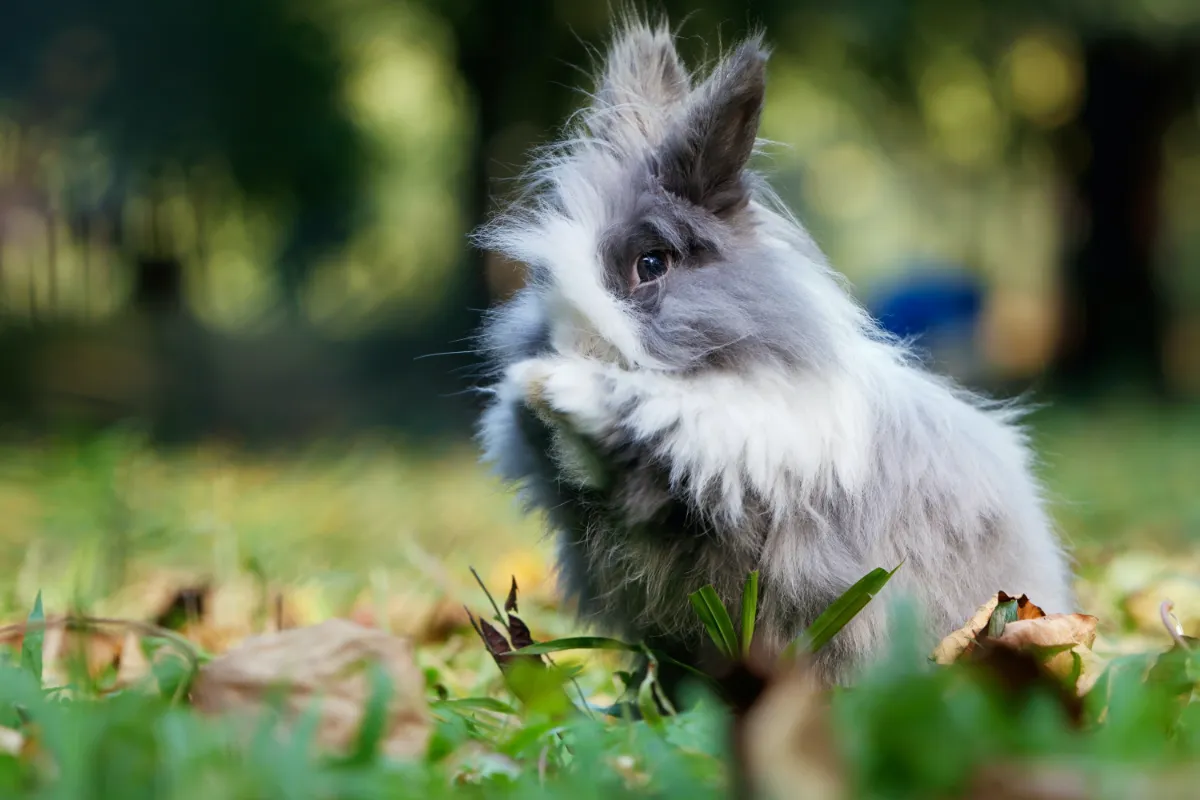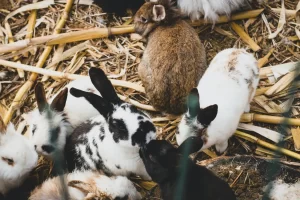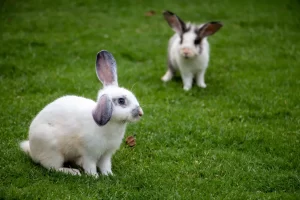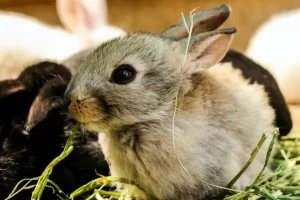Are you curious about the fascinating world of lionhead rabbit pregnancies? Get ready to dive into the secrets of their reproductive cycle!
In this article, we will explore the average duration of a lionhead rabbit’s pregnancy, the signs and symptoms to look out for, and how to prepare for the arrival of their adorable babies.
So, grab a cup of tea and get ready to become an expert on all things lionhead rabbit pregnancy!
In This Article
- 1 Key Takeaways
- 2 Understanding the Lionhead Rabbit’s Reproductive Cycle
- 3 Factors Affecting the Duration of Lionhead Rabbit Pregnancy
- 4 The Average Gestation Period of Lionhead Rabbits
- 5 Signs and Symptoms of Pregnancy in Lionhead Rabbits
- 6 Preparing for the Arrival of Lionhead Rabbit Babies
- 7 Caring for Pregnant Lionhead Rabbits and Their Newborns
- 8 Frequently Asked Questions
- 8.1 Are There Any Specific Dietary Requirements for Pregnant Lionhead Rabbits?
- 8.2 Can Lionhead Rabbits Give Birth on Their Own or Do They Require Assistance?
- 8.3 What Is the Ideal Nesting Material for Pregnant Lionhead Rabbits?
- 8.4 How Long After Giving Birth Can Lionhead Rabbits Breed Again?
- 8.5 Can Lionhead Rabbits Be Spayed or Neutered During Pregnancy?
- 9 Conclusion
Key Takeaways
- The breeding season for Lionhead rabbits occurs from late winter to early fall, during which females display territorial and nesting behaviors while males exhibit mating behaviors.
- The gestation period for Lionhead rabbits typically lasts between 28 to 35 days, with variations influenced by factors such as the age and health of the female, genetics, and environmental conditions.
- Signs and symptoms of pregnancy in Lionhead rabbits include nesting behavior, weight gain of approximately 1-2 pounds, and the possibility of complications such as dystocia, pregnancy toxemia, and uterine infections.
- To prepare for the arrival of Lionhead rabbit babies, it is important to ensure the availability of supplies and nesting materials, provide a spacious and secure nesting area, and offer a balanced diet rich in fiber and nutrients. It is also crucial to monitor the health of both the pregnant rabbit and the newborns, consult a veterinarian for dietary recommendations and regular check-ups, and maintain a clean and comfortable living environment for overall health.
Understanding the Lionhead Rabbit’s Reproductive Cycle
You should often observe the signs and behaviors that indicate the stages of the Lionhead Rabbit’s reproductive cycle. Understanding the breeding season of lionhead rabbits is crucial in identifying the right time for mating. The breeding season for lionhead rabbits typically occurs from late winter to early fall.
During this time, female rabbits experience changes in their behavior and physical appearance. They may become more territorial, aggressive, and display nesting behaviors. Male rabbits, on the other hand, may become more vocal and exhibit mating behaviors such as chin rubbing and spraying urine.
To ensure successful mating, it’s important to introduce the male and female rabbits during the female’s receptive period, which usually lasts for a few days. Monitoring these signs and behaviors will greatly increase your chances of successful breeding.
Factors Affecting the Duration of Lionhead Rabbit Pregnancy
Knowing the various factors that influence the length of a lionhead rabbit’s pregnancy can help you better understand the reproductive process.
The gestation period of a lionhead rabbit typically lasts between 28 to 35 days. However, several factors can impact the duration of their pregnancy.
One such factor is the age of the female rabbit. Younger rabbits tend to have shorter gestation periods compared to older ones.
Additionally, the health and nutrition of the rabbit play a significant role. A well-balanced diet, rich in essential nutrients, can contribute to a shorter pregnancy duration. On the other hand, poor nutrition can lead to longer gestation periods.
Other factors that may influence the length of pregnancy include environmental conditions, such as temperature and stress levels.
Understanding these factors will allow you to provide optimal care for your lionhead rabbit during its pregnancy.
The Average Gestation Period of Lionhead Rabbits
The average gestation period of lionhead rabbits is typically between 28 to 35 days, but can vary depending on various factors.
Understanding lionhead rabbit breeding patterns is essential in determining the duration of their pregnancy.
One important factor that affects gestation periods is genetics. Genetic variations can influence the length of the pregnancy, as certain genes may contribute to shorter or longer gestation periods.
Breeding rabbits with known genetic backgrounds can help breeders predict the length of the pregnancy more accurately. However, it’s important to note that genetics is just one of the many factors that can affect the gestation period, and there may still be variations even within a specific genetic lineage.
To ensure the health and well-being of the pregnant lionhead rabbits, it’s crucial to closely monitor their progress and provide proper care during this period.
Signs and Symptoms of Pregnancy in Lionhead Rabbits
During pregnancy, lionhead rabbits may exhibit a variety of signs and symptoms, such as nesting behavior and a weight gain of approximately 1-2 pounds. Breeding season in lionhead rabbits usually occurs from late winter to early spring, and the gestation period is around 28-35 days.
It is important to be aware of the potential complications that can occur during lionhead rabbit pregnancy. Some of these complications include dystocia (difficulty giving birth), pregnancy toxemia, and uterine infections.
Dystocia can be caused by factors such as oversized kits or a malformed birth canal. Pregnancy toxemia is a metabolic disorder that can occur due to poor nutrition or stress. Uterine infections can lead to pyometra, a potentially life-threatening condition.
It is crucial to monitor the health and well-being of pregnant lionhead rabbits and seek veterinary assistance if any concerning signs or symptoms arise.
| Complication | Causes | Symptoms |
|---|---|---|
| Dystocia | Oversized kits, malformed birth canal | Difficulty giving birth, straining, distress |
| Pregnancy Toxemia | Poor nutrition, stress | Loss of appetite, weight loss, lethargy |
| Uterine Infections | Bacterial infection | Vaginal discharge, fever, abdominal pain |
Preparing for the Arrival of Lionhead Rabbit Babies
Make sure you have enough supplies and nesting materials to prepare for the arrival of your lionhead rabbit babies.
Preparing for the arrival of newborn lionhead rabbits is crucial to ensure their well-being and your peace of mind. As an attentive caretaker, it’s essential to create a safe and comfortable environment for the babies and their mother.
Start by providing a spacious and secure nesting area, lined with soft bedding such as hay or shredded paper. Additionally, ensure you have an adequate supply of fresh water, high-quality rabbit feed, and a variety of nutritious treats.
Setting up a separate enclosure for the babies as they grow older is also recommended.
Caring for Pregnant Lionhead Rabbits and Their Newborns
Don’t forget to provide plenty of fresh water and a balanced diet for your pregnant lionhead rabbit and her newborns. Caring for newborn lionhead rabbits requires attention to their nutritional needs.
Pregnant lionhead rabbits should be fed a diet that’s rich in fiber, such as hay and fresh vegetables. It’s important to provide a variety of vegetables to ensure they receive all the necessary nutrients. Additionally, offering a small amount of pelleted rabbit food can help provide essential vitamins and minerals.
It’s crucial to monitor their water intake and make sure it’s clean and easily accessible.
As for the newborns, they should nurse from their mother for the first few weeks of life. After that, you can gradually introduce them to solid food by providing small amounts of fresh vegetables and pellets.
Remember to consult with a veterinarian for specific dietary recommendations and to ensure the overall health of your lionhead rabbits.
Frequently Asked Questions
Are There Any Specific Dietary Requirements for Pregnant Lionhead Rabbits?
During pregnancy, lionhead rabbits have specific dietary requirements to ensure proper prenatal nutrition and minimize potential complications. It is important to provide a balanced diet rich in fiber, fresh vegetables, and limited pellets.
Can Lionhead Rabbits Give Birth on Their Own or Do They Require Assistance?
Lionhead rabbits are capable of giving birth on their own, but it’s important to be aware of the signs of labor. Keep an eye out for nesting behavior, restlessness, and contractions.
What Is the Ideal Nesting Material for Pregnant Lionhead Rabbits?
To provide the ideal nesting material for your pregnant lionhead rabbit, consider using soft hay or straw. These options create a comfortable and warm environment. Alternatively, you can also use shredded paper or fleece to accommodate her needs.
How Long After Giving Birth Can Lionhead Rabbits Breed Again?
After giving birth, lionhead rabbits need time to fully recover before breeding again. The recommended postpartum recovery period varies, but generally, it can take a few weeks to a couple of months. It is important to allow them enough time to regain their strength before starting another breeding cycle.
Can Lionhead Rabbits Be Spayed or Neutered During Pregnancy?
Spaying or neutering pregnant lionhead rabbits can be risky. It is generally recommended to wait until after the pregnancy to proceed with the procedure. Consult a veterinarian for guidance and to ensure the health and safety of your rabbit.
Conclusion
In conclusion, the lionhead rabbit’s pregnancy lasts for approximately 31 to 33 days, which is remarkably short compared to other rabbit breeds.
It’s essential for owners to be aware of the signs and symptoms of pregnancy in order to provide the necessary care and preparation for the arrival of the newborns.
By understanding and addressing the needs of pregnant lionhead rabbits, we can ensure their well-being and the successful rearing of their adorable offspring.





